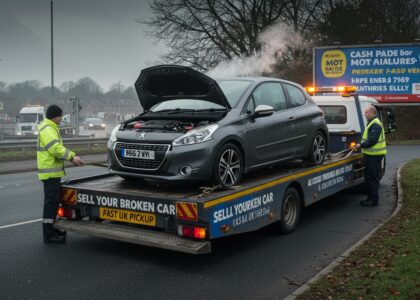When you plan to sell your car, its condition plays a strong role in the price you receive. Mechanical faults can lower the valuation, especially when buyers worry about repair bills or long-term reliability. Understanding how certain issues affect price helps you prepare better, whether you are selling privately, trading in, or dealing with a specialist buyer. Mechanical problems vary in severity, but each one influences confidence and resale value. This guide explains the most common faults, their impact, and what both individual and commercial sellers should know before entering the market.
Engine Issues That Reduce Value
Engine faults are among the most serious concerns for any buyer. Problems such as misfiring cylinders, worn timing chains, oil leaks, and poor compression indicate that the engine may require major work. Even simple symptoms like rough idling or smoke from the exhaust can worry potential buyers. Commercial buyers often check diagnostic codes and engine performance data before offering a price. For individuals hoping to Sell damaged Ford EcoBoost UK, engine condition becomes a major deciding factor because repairs can be expensive. A healthy engine increases confidence, while a problematic one quickly pushes the valuation down.
Transmission Problems And Lower Pricing
Transmission faults can significantly affect a car’s worth due to repair complexity. Signs such as delayed gear shifts, slipping gears, or fluid contamination indicate internal wear. Automatic gearboxes are particularly costly to repair or replace, and even manual transmission issues like a worn clutch can reduce valuation. Businesses looking to purchase fleet vehicles often inspect gearbox efficiency because poor transmission health directly affects operational reliability. Since these faults often worsen over time, buyers factor the risk into their pricing decisions, making sellers more likely to accept a reduced offer when they attempt to Sell my Ford EcoBoost.
Suspension Wear And Valuation Declines
The suspension system influences comfort and stability, and visible wear quickly deters buyers. Problems such as worn shock absorbers, damaged struts, or faulty control arms can lead to uneven tyre wear and reduced handling performance. Commercial audiences, especially those managing company cars or work vehicles, value suspension health because it impacts day-to-day use. Even small components like bushings or ball joints can affect long-term reliability and increase maintenance costs. When suspension issues are present, buyers often subtract repair estimates from their offer, especially when private sellers aim to Sell my EcoBoost without investing in fixes beforehand.
Brake System Concerns That Affect Price
Brake faults raise immediate safety concerns, making them significant in valuation. Worn brake pads, damaged discs, fluid leaks, or failing callipers reduce stopping power and increase risk. Safety-related issues often lead to the steepest reductions in price because buyers must consider both repair costs and legal requirements for roadworthiness. Businesses purchasing used cars for employee use often insist on a full brake inspection before agreeing to a deal. Warning lights on the dashboard, grinding noises, or vibrations during braking signal that the system needs attention. These faults can lead buyers to offer lower prices, especially when people try to Sell Ford EcoBoost UK in used condition.
Electrical System Faults and Their Influence
Electrical problems have become more common as modern vehicles rely heavily on sensors, modules, and wiring. Faults may include malfunctioning alternators, weak batteries, faulty sensors, or central locking issues. Even minor electrical faults can disrupt performance and trigger dashboard warnings. Commercial buyers often use diagnostic tools to check electronic stability systems, fuel sensors, and emission-related components. These issues not only reduce confidence but can also affect MOT results. When electrical systems show irregularities, valuations drop because troubleshooting can be time-consuming and costly.

Cooling System Failures and Decreased Offers
Faults in the cooling system can cause overheating, which may lead to severe engine damage if ignored. Radiator leaks, faulty thermostats, weak water pumps, or low coolant levels can produce temperature spikes during driving. Buyers often view overheating as a sign of underlying engine stress, making them cautious about offering higher prices. For businesses managing several vehicles, cooling system reliability is important to avoid downtime. If a seller fails to address overheating issues, the valuation usually reflects the cost of potential repairs or engine rebuilds.
Fuel System Problems and Buyer Hesitation
The fuel system plays a crucial role in performance and efficiency. Issues such as clogged injectors, weak fuel pumps, or contaminated fuel lines can reduce power and increase consumption. Buyers often check fuel pressure readings and injector performance before making an offer. A poorly performing fuel system suggests future repair needs, which lowers valuation. Commercial buyers in particular focus on fuel efficiency because it impacts operating costs. When visible symptoms appear, such as hesitation during acceleration or rough running, buyers adjust their offers accordingly.
Exhaust System Faults and Market Value
Exhaust problems like damaged catalytic converters, leaking pipes, or rusted mufflers reduce a car’s value. A faulty catalytic converter can trigger engine warning lights and affect emissions, making a vehicle less appealing. Buyers consider the cost of replacement because exhaust repairs can be expensive for certain models. Commercial fleets pay close attention to emissions compliance, as failing components may lead to fines or MOT failures. If the exhaust system shows visible damage or excessive noise, buyers often reduce their valuation to cover expected repairs.
For a smoother selling process and fair pricing for faulty or non-faulty vehicles, consider contacting Cars Wanted UK.





